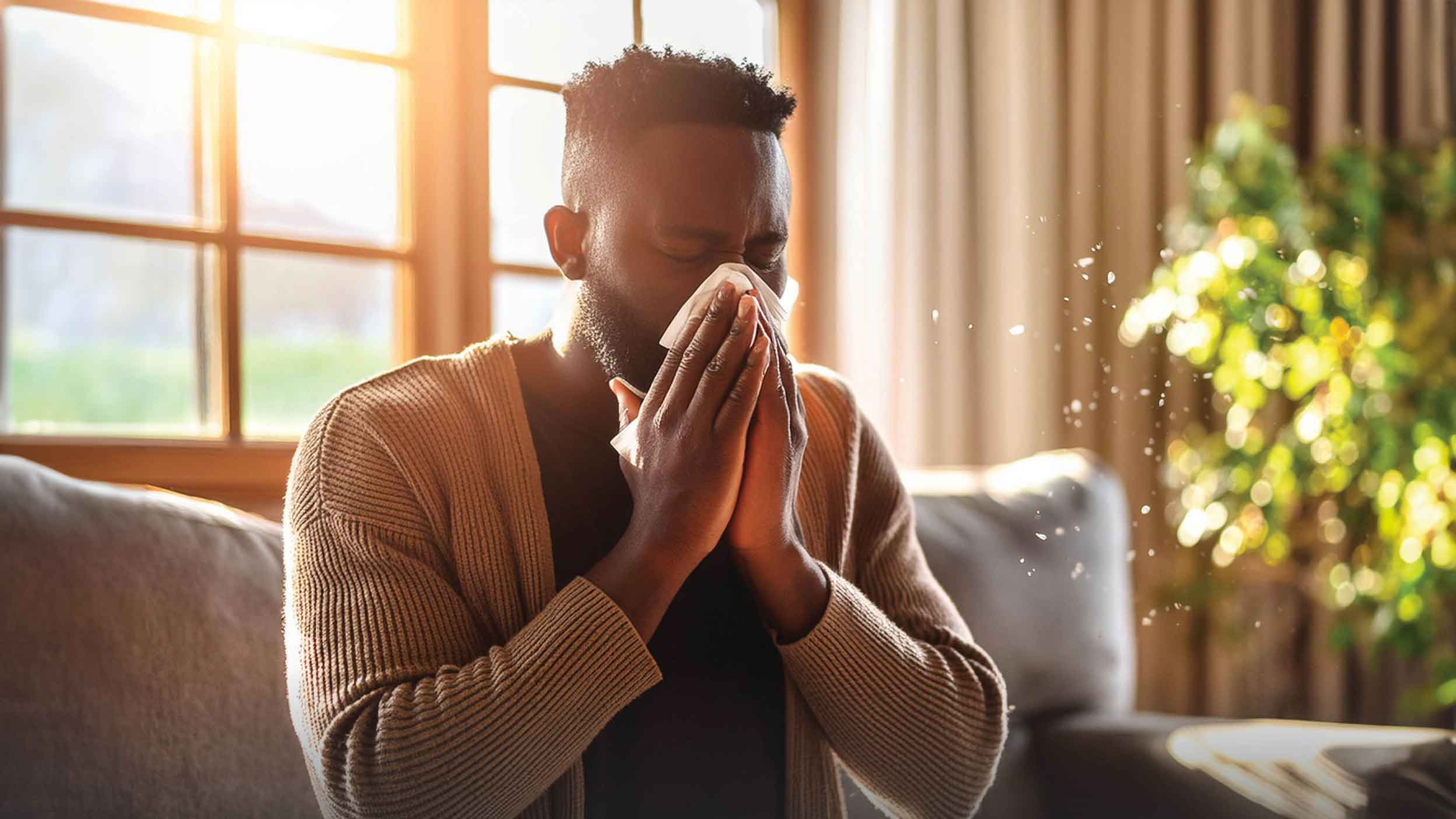
Are you frustrated dealing with constant sniffles and itchy eyes? You’re not alone! Many of us struggle with indoor air quality issues that trigger seasonal allergies and respiratory discomfort.
Despite frequent cleaning, dusting, and vacuuming, the air in your home can still be filled with invisible allergens that trigger these nasty symptoms. Everyday activities such as cooking and using certain household cleaning products can release volatile organic compounds (VOCs) into your household air. Thus, living in your home with poor indoor air quality can be a constant battle.
Rest assured! There are two types of devices that can help reduce indoor pollution – air filters and air purifiers. Let’s look at the difference between air filters vs. air purifiers to determine which one is the right option for your home!
What is an Air Filter?
The air filter is an unsung hero in the battle to help you improve your household air quality. Air filters are fundamental components of HVAC systems, and they help keep the air in your home clean by capturing airborne particles. Below, we will uncover more about what an air filter is, and how they work.
How do Air Filters Work?
Air Filters are devices designed to filter allergens and pollutants from the air. The mechanism works by capturing air through a foam, pleated, paper, or fibrous filter through your HVAC system.
Contaminants such as pollutants and allergens are trapped, preventing them from recirculating into your living space as clean air gets circulated. Additionally, they protect your HVAC equipment from dust and debris build-up, which can lead to costly repairs.
Let’s explore more about the various types of air filters:
Fiberglass Filters: These are the most common and cost-effective types of air filter. Made up of multiple layered fiberglass fibers, they capture particles like dust and lint. While effective at improving air quality, they may require more frequent replacement due to their lower efficiency.
Pleated Filters: Offering a higher level of filtration than fiberglass filters, pleated filters are constructed from a folded sheet of material. They are typically composed of polyester or cotton. Owing to their pleated nature, they cover a broader surface area, which allows them to capture smaller particles.
HEPA Filters: These are widely recognized as the premium choice for air filtration. HEPA filters are crafted from knit glass fibers and can capture 99.97% of airborne particles as small as 0.3 microns. Their efficiency extends to capturing impurities such as bacteria, viruses, and smoke particles with remarkable effectiveness.
What is an Air Purifier?
An air purifier is a powerful ally to the air filter. It works to improve indoor air quality by targeting smaller allergens, odors, and microorganisms. So, how does an air purifier work its magic to keep your air healthy?
How do Air Purifiers Work?
This device improves indoor air quality by removing extremely small pollutants from the air such as dust, airborne bacteria, and viruses. Using advanced filtration technologies, air purifiers help to circulate clean air to your living space.
Read on to learn more about a range of air purifiers:
HEPA Air Purifiers: Similar to HEPA Filters, HEPA Air Purifiers can capture airborne particles as small as 0.3 microns using their interwoven fiberglass technology. These purifiers work well in getting rid of allergens such as pollen, dust mites, and pet dander.
UV Air Purifiers: These utilize the power of ultraviolet (UV) light to sterilize and disinfect the air by killing bacteria, viruses, and fungi. UV Air Purifiers effectively destroy pathogens, making them a popular choice for those sensitive to airborne germs.
Activated Carbon Air Purifiers: Renowned for their ability to absorb and neutralize odors, gases and VOCs, these filters work a little differently. The activated charcoal chemically bonds to these pollutants and eliminates their unpleasant smells.

Air Filters vs Air Purifiers
When it comes to capturing contaminates and cleaning the air at your home, you’ll need to consider your personal needs when determining if you need air filters vs. air purifiers. They both work to effectively clean the air, but they do so in different ways, and they are effective against varying types of pollutants. For example, allergy suffers and those affected by seasonal pollen might benefit from having an air filter; whereas those who have issues with pet dander, or household odors might benefit from an air purifier.
Do Air Filters or Air Purifiers Pick Up More?
Air filters that are integrated into HVAC systems are built to capture particulate matter such as dust, pollen, pet dander, and mold spores. Higher MERV rated filters can capture up to 99.97% of particles as small as 0.3 microns. However, standard air filters may not be that effective.
Air purifiers provide a thorough approach to improving indoor air quality. They often absorb odors, VOCs, and other gases in the air. Some advanced air purifiers also use UV light to kill viruses and bacteria.
Therefore, while air filters are excellent at trapping particulate matter and are necessary to a well operating HVAC unit, air purifiers pick up an even wider range of contaminants. These include bacteria and viruses that may arise from general sneezing or coughing. The versatility of both air filters and air purifiers in targeting these contaminants makes them both valuable for comprehensive air cleaning.
Purify Your Air with Kleenex Air Filters
Air quality is essential for a healthy home environment, which is why Kleenex offers a range of HVAC air filters designed to meet your various needs. Each Kleenex Allergen Air Filter is engineered with innovative electrostatic technology to trap and capture a range of allergens and microparticles. These include:
Kleenex Allergen Air Filter – MERV 8
The Kleenex Allergen Air Filter MERV 8 rating is perfect for everyday use. It focuses on caring for everyday air by providing clean air that promotes good mental and physical health. This filter effectively captures particles such as lint, household dust, smog, and pollen.
Kleenex Advanced Allergen Air Filter – MERV 11
Those who have furry companions will find the Kleenex Advanced Allergen Air Filter helpful. Its MERV 11 rating is particularly useful for maintaining clean air in homes with pets, such as dogs and cats. Specifically designed to capture pet dander, it transforms your home from furry to filtered so you can enjoy the cuddles without sniffles.
Kleenex Elite Allergen Air Filter – MERV 12
For those with heightened sensitivity to allergens, the Kleenex Elite Allergen Air Filter, with its MERV 12 rating, offers high-end protection. Certified by the AAFA, you can be sure that it will kick your environmental allergies to the side. This filter cares for air affected by stubborn allergens by capturing household dust, mold spores, pollen, pet dander, smoke, and airborne bacteria.
Kleenex Elite Allergen Air Filter – MERV 13
The highest-performing filter in the line, the Kleenex Elite Allergen Air Filter, is designed to care for germy air. Achieving a MERV 13 rating and certified by the AAFA, its performance in trapping particulate matter such as lint and household dust, it captures airborne bacteria and particles that can carry viruses.
It’s time you surround yourself with healthy air. Find this range of air filters at local retailer to better protect your home and your family with clean air.





.webp?rev=-1)
.webp?rev=-1)
.webp?rev=-1)

